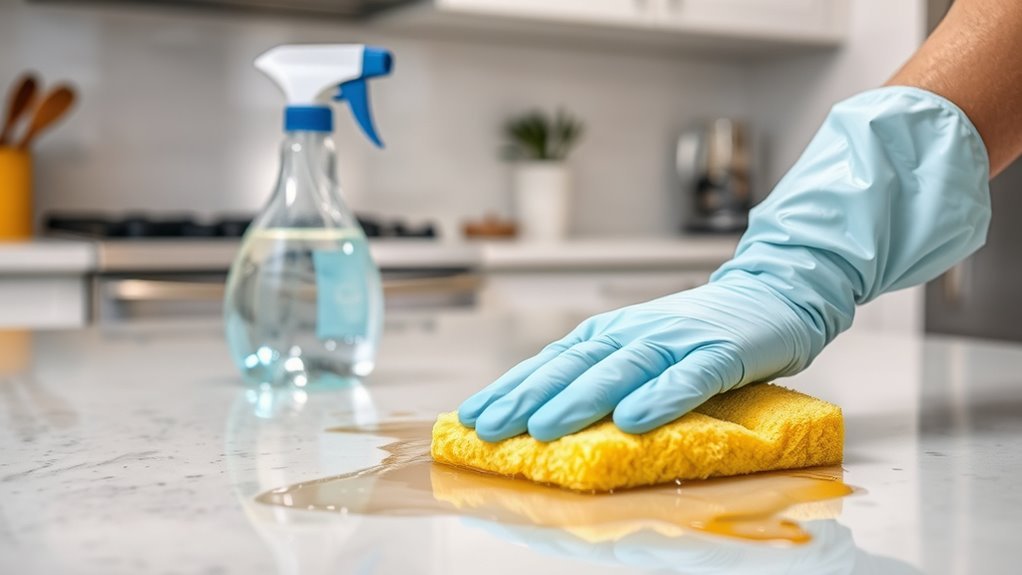How to Clean and Deodorize Your Grease
To clean and deodorize grease, first identify if it’s oil-based or food grease, as each requires a slightly different approach. Start by sprinkling baking soda on the stain to absorb oil, then spray white vinegar to fizz and break down grime. Let it sit five minutes, scrub gently with dish soap and warm water, then rinse and dry thoroughly. Using this method guarantees both removal and deodorization. For detailed guidance on preventing buildup and using commercial cleaners safely, keep exploring these tips.
Identifying Different Types of Grease Stains

Before you can effectively clean and deodorize grease, you need to identify the type of grease stain you’re dealing with. Oil based stains, such as motor oil or machine grease, are typically dark, thick, and persistent. They often require stronger solvents for removal. Food grease, on the other hand, usually comes from cooking oils, butter, or animal fats. These stains are often lighter in color but can still leave a greasy residue. To distinguish between them, consider the source and texture: oil based stains feel slick and heavy, while food grease may feel sticky or slightly tacky. Recognizing these differences allows you to choose the right cleaning method, freeing you from ineffective attempts and ensuring your space becomes fresh and clean again.
Effective Household Ingredients for Grease Removal
Household ingredients like baking soda, white vinegar, and dish soap are powerful allies when it comes to breaking down and removing grease stains. Baking soda acts as a gentle abrasive and absorbs oily residues, making it ideal for lifting grease without damaging surfaces. White vinegar’s acidic nature helps dissolve grease by breaking down its molecular structure, allowing you to wipe it away easily. When combined with dish soap, which emulsifies grease, these ingredients create a potent trio that tackles grease effectively. You can rely on baking soda for tough, baked-on grease, while white vinegar excels at cutting through fresh, liquid grease. By using these ingredients methodically, you maintain control, avoid harsh chemicals, and keep your environment fresh and free from stubborn grease buildup.
Step-by-Step Guide to Cleaning Greasy Surfaces

Now that you understand how baking soda, white vinegar, and dish soap work to break down grease, you can apply these ingredients through a clear, step-by-step process. First, sprinkle baking soda directly onto the greasy surface to absorb excess oil. Next, spray white vinegar over the baking soda, allowing the fizzing action to loosen stuck-on grime. Let it sit for five minutes. Then, mix a few drops of dish soap with warm water and use a sponge or cloth to scrub the area gently. Rinse with clean water and dry thoroughly. These grease removal techniques combine natural ingredients with effective surface cleaning methods, giving you control over a clean, fresh environment without harsh chemicals. Following this routine guarantees your surfaces stay grease-free and odorless.
Using Commercial Cleaners Safely and Efficiently
Although natural ingredients are effective for many grease-cleaning tasks, commercial cleaners can tackle tougher grime with specialized formulations. To maximize commercial cleaner safety, always read and follow the product’s instructions carefully. Wear gloves and guarantee adequate ventilation to protect yourself from fumes and skin irritation. Avoid mixing different cleaners, as this can create harmful reactions. For efficient cleaning techniques, apply the cleaner directly to the greasy surface, allowing it to sit for the recommended time to break down grease effectively. Use a non-abrasive scrubber to avoid damaging surfaces while loosening grime. Rinse thoroughly with warm water to remove residual cleaner. By combining these steps, you maintain safety while achieving powerful, efficient grease removal, giving you freedom from stubborn buildup without unnecessary risk.
Tips to Prevent Grease Buildup and Maintain Freshness

Once you’ve tackled tough grease with commercial cleaners, keeping it from building up again will save you time and effort in the long run. Implementing preventative measures through consistent kitchen habits is key. Regularly wiping surfaces after cooking, using splatter guards, and ventilating your kitchen reduce airborne grease. Also, clean exhaust fans and filters monthly to maintain freshness.
| Preventative Measure | Kitchen Habit | Benefit |
|---|---|---|
| Wipe surfaces immediately | Use microfiber cloths | Prevents grease accumulation |
| Use splatter guards | Cover pans during frying | Limits grease spread |
| Ventilate kitchen | Open windows or use fans | Reduces airborne grease |
| Clean exhaust filters | Monthly deep cleaning | Enhances air quality |
| Dispose of grease properly | Avoid pouring down drains | Prevents clogs and odors |
Adopting these steps guarantees your kitchen stays grease-free, empowering your freedom in a clean space.
Frequently Asked Questions
Can Grease Stains Damage Fabric Fibers Permanently?
Yes, grease stains can damage fabric fibers permanently if not treated promptly. You’ll want to act quickly using effective grease removal techniques, like blotting excess grease and applying gentle solvents. Protect your fabric by testing cleaning agents on a small area first. Following fabric protection methods guarantees you don’t weaken fibers during cleaning. With careful, methodical care, you can maintain your fabric’s integrity and enjoy the freedom of fresh, stain-free garments.
Is It Safe to Use Bleach on Greasy Kitchen Surfaces?
You can use bleach on greasy kitchen surfaces, but you need to be cautious about kitchen safety. Bleach effectiveness is high for disinfecting and cutting through grease, but it can damage some materials and emit strong fumes. Always dilute bleach properly, wear gloves, and guarantee good ventilation. Avoid using bleach on porous or colored surfaces to prevent damage. Following these steps lets you clean thoroughly while keeping your kitchen safe and fresh.
How Do I Dispose of Grease and Oily Rags Safely?
When handling grease disposal methods, you want to avoid pouring it down drains. Instead, let the grease cool and solidify, then scrape it into a sealed container for trash. For oily rags recycling, don’t toss them casually—store used rags in a metal container with a tight lid to prevent fire hazards. Check local facilities for hazardous waste collection or specialized recycling programs to dispose of oily materials safely and responsibly.
What Are the Environmental Impacts of Grease Cleaners?
Think of chemical runoff as a silent river, carrying harmful substances into ecosystems when you use harsh grease cleaners. You’ll want to choose eco friendly alternatives that break down grease without poisoning the environment. These products reduce toxic residues and protect waterways, giving you the freedom to clean thoroughly without guilt. By being methodical in selecting biodegradable options, you contribute to a healthier planet while keeping your space spotless.
Can Essential Oils Help Deodorize Grease Smells Effectively?
You can definitely use essential oil blends as natural deodorizing methods to tackle stubborn grease smells. By mixing oils like lemon, eucalyptus, or tea tree, you create a powerful scent combo that neutralizes odors instead of just masking them. Apply a few drops diluted in water or vinegar to the affected area, and let it sit. This approach gives you an eco-friendly way to refresh spaces without harsh chemicals, keeping your environment fresh and free.






